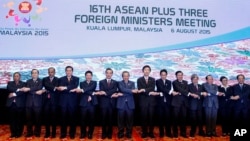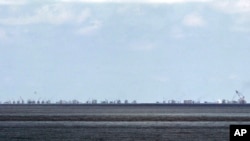Land reclamation in the South China Sea has "increased tensions" in the region, according to Southeast Asian foreign ministers, who wrangled for days about how to word their annual communique.
The comments came Thursday after members of the Association of Southeast Asian Nations concluded their summit in Kuala Lumpur, Malaysia. The group, known as ASEAN, expressed "serious concerns" about China's construction work, noting some ministers are worried the activities may "undermine peace, security and stability in the South China Sea."
The document, issued two days after the ministers' formal session in the Malaysian capital, also declared that China and ASEAN countries will proceed to the "next stage" of consultations on a binding code of conduct for behavior at sea.
A senior Southeast Asian diplomat quoted by Reuters said most members of the 10-nation bloc pushed hard for a "united, comprehensive" statement on the South China Sea despite pressure from Beijing.
Several ASEAN members have pressed for a code of conduct for more than a decade. Beijing, however, has resisted. As a claimant to most of the South China Sea, the Chinese government has traditionally viewed the code as a threat to its interests, although its public position appears to have softened somewhat in recent years.
Artificial islands at issue
This week, China’s foreign minister, Wang Yi, called on countries to “speed up consultations” on the code of conduct. ASEAN representatives endorsed the plan.
This year, China dramatically sped up building artificial islands in parts of the disputed sea, dredging sand to build islands on top of reefs and completing an airstrip. Wang told reporters his country has now completed the land reclamation.
“I hope it's true. I don't know yet,” U.S. Secretary of State John Kerry said Thursday at a news conference in the Malaysian capital. “What's really needed though is an agreement to stop not just the reclamation but the large-scale construction and militarization.”
The U.S. secretary of state said the easiest thing would be for all claimants not to do anything on the disputed islets and reefs except “routine maintenance” while the legal process is resolved “in order to give certainty to everybody.”
China, Vietnam, Malaysia, Taiwan and the Philippines all have overlapping claims in the vast South China Sea, a region critical for shipping and fishing.
Seeking migration dialogue
The ASEAN regional forum communique also took up the region's humanitarian crisis that has seen thousands of people being smuggled on perilous sea journeys from Bangladesh and Myanmar, mostly to Malaysia.
The document calls for “ongoing dialogue to address the complex and multi-dimensional issues related to irregular migration.”
The communique, in an item directed at North Korea, called on concerned parties to refrain from “repeated ballistic missile launches” and for Pyongyang to work with China, the U.S., Japan, Russia and South Korea to resume the long-stalled six-party talks aimed at the denuclearization of the Korean peninsula.
This week’s meetings in Malaysia included observers from China, the United States and other countries.
ASEAN, founded in 1967 as a political and economic organization, traditionally avoids conflict or interference in the internal affairs of its members.
The language for the reference to the maritime dispute in this year's communique was seen as pitting the Philippines and Vietnam, which wanted a tougher tone, against other countries, such as Cambodia, Laos and Myanmar, which tend to side with China.








